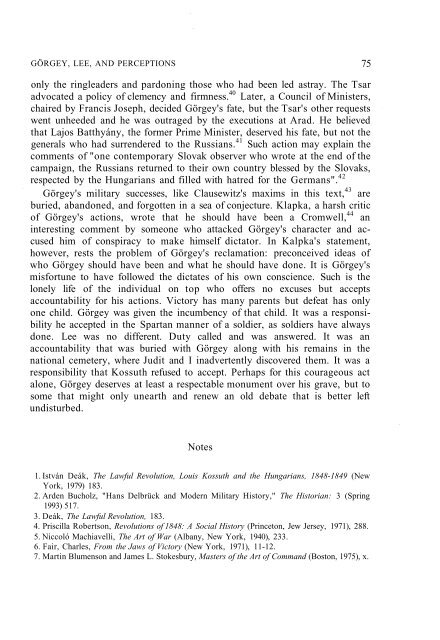74 SAMUEL J. WILSONfrom occurring, and Lee surrendered to him at Appomattox. However, evenif this junction had taken place, the South's defeat was just a matter of time.The same scenario was in store for Görgey. His chances for a military solutionwere at best slim to none. Hope, after his failure to defeat Haynau, lay in theconsolidation of all Hungarian troops in the south to defeat the Austrians,prolonging the war, and, in addition, in the chance that some sort of wedgecould be driven between the Russians and Austrians that would facilitate eithera negotiated settlement favorable for Hungary or intervention by the westerndemocracies. Görgey was looking for the best possible deal. Victory was aquixotic illusion. It was something Kossuth still believed possible. Accordingto Ian Roberts, "Unlike Kossuth who was first and foremost a politician whofound himself having to deal with military affairs by virtue of the office heheld, Görgey was a professional soldier of a distinctly practical nature." 30Unfortunately for Görgey and Hungary, his Appomattox lay ahead at Világos.Görgey's reputation was seriously tarnished by his surrender. Accusationsabound concerning his alleged treachery, but Görgey did not go south for thepurpose of surrendering his forces. Once at Arad, where he found no troops,he proceeded to send the First Corps of General József Nagy Sándor toTemesvár in order to reinforce Dembinski, who was to be at Arad but hadchanged his plans. 37 This is not the behavior of one who is determined tosurrender; on the contrary, it shows Görgey's intent to continue the struggle.He was still determined to work out the best deal for Hungary, and his armywas still his best bargaining chip. Even in southern Hungary his last ditchdefense was an offensive against Austria. 38 It was Dembinski's defeat on 9August that ended the last probability of a successful offensive against Austria.According to Görgey,The further continuance of our active resistance to the armies of the Allies could nowat most promote personal, no longer national interest... [the country] might at least befreed from the horrible misery of war. 39After his surrender to the Russians, Görgey's reputation might still havebeen saved had he been included as one of those punished at Arad. Görgeyseems to have even expected such punishment. The Tsar, however, intervenedwith Vienna to spare Görgey's life. After all the Tsar had done for FrancisJoseph, it would have been a grave insult to deny Nicholas' request. Both theTsar and Paskevich, who gave Görgey money for his expenses because even asa prisoner, he had to pay for his own travel, believed that the Hungariansshould be granted leniency. The Tsar sent the Tsarevich Alexander II toFrancis Joseph to inform the young monarch that Nicholas favored punishing
GÖRGEY, LEE, AND PERCEPTIONS 75only the ringleaders and pardoning those who had been led astray. The Tsaradvocated a policy of clemency and firmness. 40 Later, a Council of Ministers,chaired by Francis Joseph, decided Görgey's fate, but the Tsar's other requestswent unheeded and he was outraged by the executions at Arad. He believedthat Lajos Batthyány, the former Prime Minister, deserved his fate, but not thegenerals who had surrendered to the Russians. 41 Such action may explain thecomments of "one contemporary Slovak observer who wrote at the end of thecampaign, the Russians returned to their own country blessed by the Slovaks,respected by the Hungarians and filled with hatred for the Germans". 42Görgey's military successes, like Clausewitz's maxims in this text, 43 areburied, abandoned, and forgotten in a sea of conjecture. Klapka, a harsh criticof Görgey's actions, wrote that he should have been a Cromwell, 44 aninteresting comment by someone who attacked Görgey's character and accusedhim of conspiracy to make himself dictator. In Kalpka's statement,however, rests the problem of Görgey's reclamation: preconceived ideas ofwho Görgey should have been and what he should have done. It is Görgey'smisfortune to have followed the dictates of his own conscience. Such is thelonely life of the individual on top who offers no excuses but acceptsaccountability for his actions. Victory has many parents but defeat has onlyone child. Görgey was given the incumbency of that child. It was a responsibilityhe accepted in the Spartan manner of a soldier, as soldiers have alwaysdone. Lee was no different. Duty called and was answered. It was anaccountability that was buried with Görgey along with his remains in thenational cemetery, where Judit and I inadvertently discovered them. It was aresponsibility that Kossuth refused to accept. Perhaps for this courageous actalone, Görgey deserves at least a respectable monument over his grave, but tosome that might only unearth and renew an old debate that is better leftundisturbed.<strong>No</strong>tes<strong>1.</strong> István Deák, The Lawful Revolution, Louis Kossuth and the Hungarians, 1848-1849 (NewYork, 1979) 183.2. Arden Bucholz, "Hans Delbrück and Modern Military History," The Historian: 3 (Spring1993) 517.3. Deák, The Lawful Revolution, 183.4. Priscilla Robertson, Revolutions of 1848: A Social History (Princeton, Jew Jersey, 1971), 288.5. Niccoló Machiavelli, The Art of War (Albany, New York, 1940), 233.6. Fair, Charles, From the Jaws of Victory (New York, 1971), 11-12.7. Martin Blumenson and James L. Stokesbury, Masters of the Art of Command (Boston, 1975), x.
- Page 1 and 2:
Papers of the Radnóti Memorial Con
- Page 3:
HUNGARIAN STUDIESVOLUME 11, 1996 CO
- Page 8 and 9:
6 GEORGE GÖMÖRIprobably Fürst an
- Page 10 and 11:
8 GEORGE GÖMÖRIof the utmost impo
- Page 12 and 13:
10 GEORGE GÖMÖRIén e földön...
- Page 14 and 15:
12 GEORGE GÖMÖRINotes1. Miklós R
- Page 16 and 17:
14 MIHÁLY SZEGEDY-MASZÁKself alwa
- Page 18 and 19:
16 MIHÁLY SZEGEDY-MASZÁKtype is r
- Page 20 and 21:
18 MIHÁLY SZEGEDY-MASZÁKpose, the
- Page 22 and 23:
20 MIHÁLY SZEGEDY-MASZÁK"Wozu Dic
- Page 24 and 25:
22 MIHÁLY SZEGEDY-MASZÁKand Wilme
- Page 26 and 27: 24 MIHÁLY SZEGEDY-MASZÁKbeen the
- Page 28 and 29: 26 MIHÁLY SZEGEDY-MASZÁKBolond, k
- Page 30 and 31: 28 MIHÁLY SZEGEDY-MASZÁK6. Emery
- Page 32 and 33: 30 ZSUZSANNA OZSVÁTHand breaks as
- Page 34 and 35: 32 ZSUZSANNA OZSVÁTHThe drama echo
- Page 36: 34 ZSUZSANNA OZSVÁTHcontinents at
- Page 39 and 40: FROM CAIN TO NAHUM 37which, as Csap
- Page 41 and 42: \FROM CAIN TO NAHUM 39and bears and
- Page 43 and 44: FROM CAIN TO NAHUM 41who sees what
- Page 45 and 46: FROM CAIN TO NAHUM 438. "A félelme
- Page 47 and 48: HELP ME, PASTORAL MUSE:THE VIRGELIA
- Page 49 and 50: HELP ME, PASTORAL MUSE 47compete! W
- Page 51 and 52: HELP ME, PASTORAL MUSE 49of a priva
- Page 53 and 54: HELP ME, PASTORAL MUSE 51Once again
- Page 55 and 56: HELP ME, PASTORAL MUSE 53Eighth Ecl
- Page 57 and 58: HELP ME, PASTORAL MUSE 55have that
- Page 59: HELP ME, PASTORAL MUSE 57Paul de Ma
- Page 62 and 63: 60 SAMUEL J. WILSONWe did, however,
- Page 64 and 65: 62 SAMUEL J. WILSONbeings and contr
- Page 66 and 67: 64 SAMUEL J. WILSONHungarians would
- Page 68 and 69: 66 SAMUEL J. WILSONthe Austrians. G
- Page 70 and 71: 68 SAMUEL J. WILSONnorth-eastern Zi
- Page 72 and 73: 70 SAMUEL J. WILSONoriginally pursu
- Page 74 and 75: 72 SAMUEL J. WILSONGörgey's decisi
- Page 78 and 79: 76 SAMUEL J. WILSON8. Artúr Görge
- Page 80 and 81: 78 STEVEN TÖTÖSY de ZEPETNEKtört
- Page 82 and 83: 80 STEVEN TÖTÖSY de ZEPETNEKThe c
- Page 84 and 85: 82 STEVEN TÖTÖSY de ZEPETNEKher u
- Page 86 and 87: 84 STEVEN TÖTÖSY de ZEPETNEKthe b
- Page 88 and 89: 86 STEVEN TÖTÖSY de ZEPETNEKrooti
- Page 90 and 91: 88 STEVEN TÖTÖSY de ZEPETNEKcriti
- Page 92 and 93: 90 STEVEN TÖTÖSY de ZEPETNEK'My f
- Page 94 and 95: 92 STEVEN TÖTÖSY de ZEPETNEKshe d
- Page 96 and 97: 94 STEVEN TÖTÖSY de ZEPETNEKNotes
- Page 99 and 100: BERLIN ET PARIS DE LAJOS TIHANYIVAL
- Page 101 and 102: BERLIN ET PARIS DE LAJOS TIHANYI 99
- Page 103 and 104: BERLIN ET PARIS DE LAJOS TIHANYI 10
- Page 105 and 106: BERLIN ET PARIS DE LAJOS TIHANYI 10
- Page 107 and 108: BERLIN ET PARIS DE LAJOS TIHANYI 10
- Page 109 and 110: BERLIN ET PARIS DE LAJOS TIHANYI 10
- Page 111 and 112: BERLIN ET PARIS DE LAJOS TIHANYI 10
- Page 113 and 114: BERLIN ET PARIS DE LAJOS TIHANYI 11
- Page 115: BERLIN ET PARIS DE LAJOS TIHANYI 11
- Page 118 and 119: 116 KEVIN E. KELLYfilms Lugosi made
- Page 120 and 121: 118 KEVIN E. KELLYthe provinces, no
- Page 122 and 123: 120 KEVIN E. KELLYWith his brief an
- Page 124 and 125: 122 KEVIN E. KELLYboth his and Dean
- Page 126 and 127:
124 KEVIN E. KELLYfollowed it into
- Page 128 and 129:
126 KEVIN E. KELLYvampiric nobleman
- Page 130 and 131:
128 KEVIN E. KELLYThe film also boo
- Page 132 and 133:
130 KEVIN E. KELLYWood remained one
- Page 134 and 135:
132 KEVIN E. KELLYLugosi, convinced
- Page 136 and 137:
134 KEVIN E. KELLY19. Lennig, 112-1
- Page 139 and 140:
THE AGON OF IRONY AND SATIREIN GYÖ
- Page 141 and 142:
THE AGON OF IRONY AND SATIRE 139poe
- Page 143 and 144:
THE AGON OF IRONY AND SATIRE 141tra
- Page 145 and 146:
THE AGON OF IRONY AND SATIRE 143fek
- Page 147 and 148:
THE AGON OF IRONY AND SATIRE 145ner
- Page 149 and 150:
THE AGON OF IRONY AND SATIRE 147whi
- Page 151 and 152:
THE AGON OF IRONY AND SATIRE 149mov
- Page 153 and 154:
THE AGON OF IRONY AND SATIRE 151for
- Page 155 and 156:
THE AGON OF IRONY AND SATIREA harma
- Page 157 and 158:
MURDER IN THE MOUNTAINSTranslated b
- Page 159 and 160:
MURDER IN THE MOUNTAINS 157"Afraid?
- Page 161 and 162:
MURDER IN THE MOUNTAINS 159Abády,
- Page 163 and 164:
MURDER IN THE MOUNTAINS 161"The mar
- Page 165 and 166:
MURDER IN THE MOUNTAINS 163Bálint
- Page 167 and 168:
MURDER IN THE MOUNTAINS 165"That is
- Page 169 and 170:
MURDER IN THE MOUNTAINS 167at hand,
- Page 171 and 172:
CONTRIBUTORSMiklós BÁNFFYLászló
















